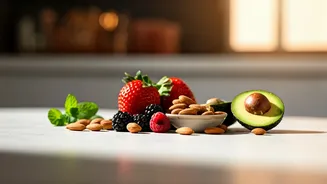Blueberries: Brain Powerhouses
Blueberries are often hailed as a brain-boosting superfood, and for good reason. They are brimming with antioxidants, including anthocyanins, which give
them their vibrant color and play a crucial role in protecting brain cells from damage caused by free radicals. These antioxidants also help to reduce inflammation throughout the body, including in the brain. Inflammation can contribute to cognitive decline over time, making blueberries a smart choice for supporting long-term brain health. Regular consumption of blueberries has been linked to improved memory and a slower rate of cognitive decline. You can easily add blueberries to your diet by enjoying them in your morning cereal, blending them into smoothies, or simply snacking on a handful throughout the day.
Fatty Fish: Omega-3 Benefits
Fatty fish, such as salmon, tuna, and mackerel, are rich in omega-3 fatty acids, which are essential for brain health. The brain is made up of a significant amount of fat, and omega-3s are a key component of this structure. These fatty acids help to build and maintain brain cell membranes, improving communication between brain cells. This enhanced communication is vital for memory, learning, and overall cognitive function. Omega-3s also possess anti-inflammatory properties that protect the brain from age-related decline. The American Heart Association recommends eating fish at least twice a week to get enough omega-3s. If you do not eat fish, you can consider omega-3 supplements, such as fish oil, to help get the required amount.
Dark Chocolate: Antioxidant Treat
Dark chocolate, particularly varieties with a high cocoa content, offers a delightful way to support brain health. It is packed with flavonoids, which are potent antioxidants that can improve blood flow to the brain. Improved blood flow ensures that the brain receives a steady supply of oxygen and glucose, which are critical for optimal function. Flavonoids also have anti-inflammatory and antioxidant effects, helping to protect brain cells. They may also improve memory and learning. Look for dark chocolate with at least 70% cocoa. Enjoy it in moderation as part of a balanced diet. A few squares of dark chocolate can be a delicious and beneficial addition to your daily routine, contributing to both your well-being and brain health.
Nuts and Seeds: Vitamin E Power
Nuts and seeds are an excellent source of vitamin E, an antioxidant that protects brain cells from oxidative stress. Oxidative stress can damage cells, contributing to cognitive decline and age-related brain issues. Studies suggest that vitamin E may improve cognitive function and reduce the risk of Alzheimer's disease. Almonds, walnuts, and sunflower seeds are particularly rich in vitamin E. A small handful of these each day can help maintain cognitive function. Incorporating a variety of nuts and seeds into your diet offers a delicious and effective way to nourish your brain. Use them as a snack, add them to your salads, or sprinkle them on your breakfast cereal.
Avocados: Healthy Fats
Avocados are known for their healthy monounsaturated fats, which support blood flow to the brain, promoting optimal brain function. Healthy blood flow is crucial for delivering oxygen and nutrients to the brain. Avocados are also rich in antioxidants and vitamins. The healthy fats in avocados also contribute to the absorption of fat-soluble vitamins, further boosting their nutritional value. Besides the brain benefits, avocados are versatile and easy to incorporate into your diet. Add slices to salads, sandwiches, or enjoy them as a dip with vegetables. The regular consumption of avocados can contribute to improved cognitive function and overall health.
Whole Grains: Steady Energy
Whole grains, such as brown rice, oatmeal, and whole-wheat bread, provide the brain with a steady supply of glucose, which is essential for energy. The brain constantly needs glucose to function, and whole grains help to regulate blood sugar levels, preventing spikes and crashes that can impair cognitive function. Unlike refined grains, whole grains release glucose slowly, ensuring a consistent energy supply throughout the day. They also contain fiber, which helps keep you feeling full and supports gut health, which has a significant impact on brain function. Consider including whole grains in your breakfast, lunch, and dinner to help maintain consistent energy levels and promote mental clarity.
Broccoli: Vitamin K Boost
Broccoli, a cruciferous vegetable, is packed with nutrients that are beneficial for brain health. It is particularly rich in vitamin K, which is essential for cognitive function and may improve memory. Broccoli also contains antioxidants that protect brain cells from damage. It is also a good source of fiber, which supports gut health, again, critical to the brain's overall function. Steaming, roasting, or lightly stir-frying broccoli are excellent ways to retain its nutritional value. Incorporate broccoli into your meals a few times a week, or as often as you can, to support brain health. The versatility of broccoli makes it a simple addition to almost any meal, from side dishes to stir-fries.
Oranges: Vitamin C Benefits
Oranges are an excellent source of vitamin C, an antioxidant that protects brain cells from damage caused by free radicals. Vitamin C also plays a role in cognitive function and can help to prevent mental decline. It supports the production of neurotransmitters, which are essential for communication between brain cells. In addition to oranges, other citrus fruits like grapefruits and lemons also contain high levels of vitamin C. Enjoying a glass of fresh orange juice or eating an orange as a snack is a delicious and effective way to support brain health. Regular consumption of vitamin C-rich foods can contribute to improved cognitive function and a healthy brain.
Eggs: Choline Power
Eggs are a good source of choline, a nutrient crucial for brain development and function. Choline is used to produce acetylcholine, a neurotransmitter involved in memory and communication between brain cells. It also supports overall brain health. Eggs are also rich in other essential nutrients, including protein and vitamins. Including eggs in your diet is a simple way to boost your choline intake and support cognitive function. They are versatile and can be prepared in various ways, such as scrambled, boiled, or poached. Eating eggs regularly can contribute to improved memory and mental clarity.
Green Tea: Brain-Boosting Drink
Green tea is packed with antioxidants, particularly catechins, which help to protect brain cells from damage. Green tea also contains caffeine, which can enhance alertness and improve cognitive function. The combination of antioxidants and caffeine makes green tea an excellent beverage for supporting brain health. It can improve memory, focus, and overall cognitive performance. Drinking a cup of green tea can provide a gentle energy boost without the jitters associated with other caffeinated beverages. Consuming green tea regularly can be a delicious way to support brain health and enhance mental clarity. It's a healthy beverage that can easily be incorporated into your daily routine.














